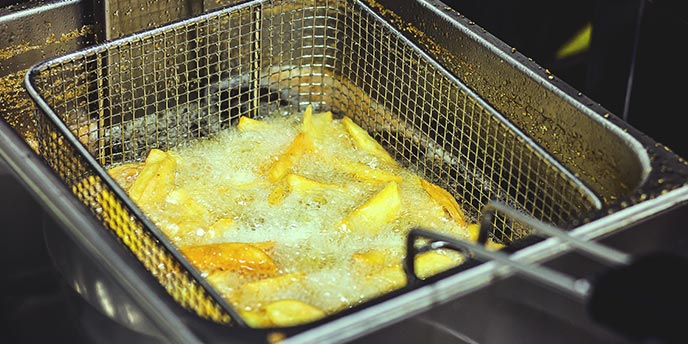How To Get Rid Of Cooking Oil
The Complete Guide to Grease and Cooking Oil Disposal
9
Deep-frying your holiday turkey? Roasting your veggies in bacon grease for extra flavor? While cooking oil and grease can add a savory taste to any meal, they can also make a real mess in your kitchen. Make sure you know what to do with it after cooking, because incorrectly disposing of cooking oil and grease can have expensive consequences, like an emergency holiday call to a plumber. Keep reading to learn how to properly dispose of grease and oil after cooking (and what not to do). The best way to get rid of cooking oil and grease is simple – throw it in the trash. Follow these steps to learn the safest way to dispose of these hot liquids: Once you've gotten rid of most of the grease, use a paper towel to wipe down all pots, pans and dishes that came into contact with the oil before rinsing them in the sink. Even small amounts of leftover grease are dangerous to your plumbing because it will build up over time. "Keep in mind that grease in drains, combined with food scraps from big meal preparation, is what makes our phones ring off the hook the day after Thanksgiving. That's why it's our busiest day of the year." Paul Abrams | Roto-Rooter Services Co. Not ready to throw away the oil just yet? Fats can be reused or recycled to give them second life. As long as it has been cooked correctly and not heated past its smoke point, you can take steps to reuse your oil and fats. To reuse cooking oil: You can reuse oil for deep frying, pan frying, sautéing and baking. After a few uses or when the oil goes bad, be sure to dispose of cooking oil in the trash can, as instructed above. Some municipalities collect used kitchen grease and oil for recycling. Use this recycling locator to find a facility near you. By using this option for cooking oil disposal, you will keep your grease out of the landfill and turn it into a form of alternative energy, like biodiesel. To recycle your oil: When you're recycling through a collection facility, you can usually mix different kinds of oils and fats together in one container unless your collection site tells you differently. The collection container does not need to be refrigerated, so this is an easy way to get rid of cooking oil and grease. Source: Roto-Rooter The trash can is the best way to dispose of cooking oil, but people often try to get rid of grease and cooking oil in other ways that are not advisable. Follow these important rules when disposing of grease: Pouring oil down the drain or toilet causes clogs in your home plumbing system and contributes to larger clogs in the municipal lines that can ultimately lead to thousands of dollars' worth of damage. Oil and grease may be liquid when hot, but will cool inside your pipes, congealing and gathering other oil particles. As the grease collection grows, it will prevent water from flowing through and cause it to back up into your kitchen and bathroom. "Never pour cooking oil or grease down a drain. Hot cooking oil will solidify inside the drainpipe just like candle wax, which gradually decreases the diameter of the pipe with a greasy buildup until the pipe stops draining altogether." Paul Abrams | Roto-Rooter Services Co. Accidents do happen when it comes to cooking oil disposal, especially when you have guests trying to help you tidy up after a holiday meal. If grease or cooking oil does make its way into your sink, take immediate action with these tips from Roto-Rooter: If your sink is still slow, use a plunger to further dislodge the grease clog. Not having any luck with these fixes? Unfortunately, you will need to call a plumber. Tossing your used cooking oil outside is not a proper way to dispose of grease. If you pour oil on the ground, it will eventually make its way into the sewer system and cause clogs there. Additionally, animal or vegetable-based oils and greases can cause issues for wildlife when left outside, according to the EPA. While small amounts of vegetable-based oils in your compost may be fine, a large amount will cause airflow and moisture issues, ruining your fertilizer. Animal fats should be kept out of your compost pile because they will smell, attract vermin and cause other problems that could make your compost unhealthy. No matter what type of oil or grease you're using, do not dispose of it in your compost pile. Whether you're cooking a big holiday meal or frying up breakfast, be smart with excess grease by disposing of it properly in your trash can or recycling it for future use. Unless you want to invite your local plumber over for dessert, always avoid pouring oil down the drain. For more holiday tips, check out these posts:How to Dispose of Bacon Grease and Oil the Right Way


What to Do With Oil After Cooking
Reuse Your Cooking Oil at Home
Recycle Your Cooking Oil at a Local Collection Site

How Not to Dispose of Cooking Oil and Grease
1. Don't Pour Oil Down the Drain
What if Grease Goes Down the Drain?
2. Don't Pour Used Cooking Oil Outside
3. Don't Dispose of Cooking Oil in Your Compost Pile
Minimizing Effects on Your Household While Maximizing Taste
How To Get Rid Of Cooking Oil
Source: https://www.budgetdumpster.com/blog/how-to-dispose-cooking-oil/
Posted by: matticegooked1970.blogspot.com

0 Response to "How To Get Rid Of Cooking Oil"
Post a Comment